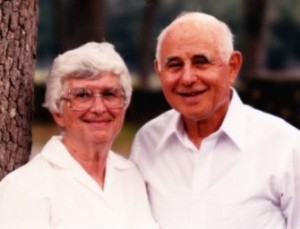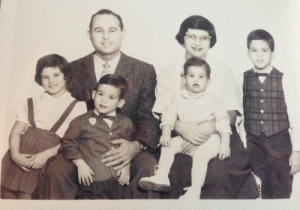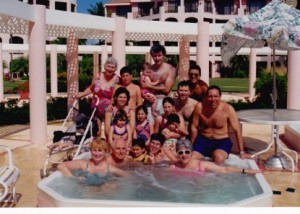COMING OUT & PUSHING BACK AGAINST ALZHEIMER’S PART 1, BY JOAN BRUNWASSER
September 14, 2015Guest Bloggers Joan Brunwasser & Elaine Reisman
February 10, 2014
You can read more about Elaine and Bernie’s story here on The Genius of Caring site.
My guest today is Elaine S. Reisman. Welcome back to OpEdNews, Elaine. In 2011, we discussed your new interest, teaching drama to senior citizens.
the happy couple, BA [Before Alzheimer’s] (image by Reisman family collection) DMCA
Joan Brunwasser: Today, we’re going to be discussing something very different. Over the last number of years, you’ve become immersed in the subject of Alzheimer’s. Why?
Elaine S. Reisman: In May 1995, my husband, Bernie, went to a convention in Florida with some colleagues. I had been a bit concerned about his asking me the same questions over again and repeating some statements, but he still seemed to be functioning well. What alerted me that there was more to it was that he did not come home on the day he said he was to arrive home. I guessed that he had been confused and checked the hotel, verifying that he was still there. Since he was traveling with other people, I realized that he was OK and said nothing about it when he came home.
For about 30 years, he was a much revered professor and director of a graduate program at Brandeis University. When he decided to step down as director, he continued teaching and presenting workshops. Then, I began to learn from his secretaries that he was asking them to repeat tasks they had already done. That and the Florida incident made me quite certain that he was on the ‘dementia’ road. His father and several aunts and uncles had had Alzheimer’s.
For the next four years, he continued to teach and I continued to hear from secretaries and colleagues of their concern about his functioning. At home, memory was an issue, although he was still able to tend to his daily needs, drive to where he was going and keep appointments.
JB: How did you react to his slipping behavior?
ESR: I found myself losing patience and sought help from the Alzheimer’s Association. I joined a group which afforded me emotional support as well as practical information. I chose a group that also had a patient support group. Bernie was not ready at that time to go to the patient group as they were much further along than he.
After I had been going for a while, I had eye surgery and it was necessary for him to drive me to the group. By that time, he was further along in the disease, so when he came in with me, I introduced him to the others, including the leaders of the group for the patients. He was amenable to their invitation and began to attend the group.
Several weeks after he started, a reporter from the Boston Globe came to the patient group. Bernie asked me if it was OK to agree that they could publish his name and information. I told him that was up to him. He answered that he was concerned that his students then would know and have less respect for him. I assured him that they continue to respect him and that some of them have been aware that he was having memory problems.
He agreed to having his picture in the paper with the comments he had made in the group. However, he continued to to talk about the article for a long time after with a “Wow! That was really something! It was tough to think that I, a respected Brandeis professor, had this disease.”
That really started what I call the pushback.
JB: What do you mean by pushback, Elaine?
ESR: With it now being public that he had the disease, things were ever so much easier for the family and for him. We no longer had to cover up. I pursued finding resources to aid our coping and signed up with the HOPE (Health Outreach Program for the Elderly) study at Boston University. Through HOPE, we were asked to participate in a variety of research projects. In addition, he was asked to introduce speakers for programs through the Alzheimer’s Association and we both met with students in medical school classes to discuss the disease and our ways of coping with it. We testified before state and national committees about the needs for research and for training personnel to work with individuals with Alzheimer’s. We made several videos, including one used for stimulating discussion about the cessation of driving. We became part of an advisory committee for the Alzheimer’s Association. Each year members of our family participate in raising funds and walking in the Walk to End Alzheimer’s.
Participating in these various ways helped us to feel that we were pushing back at the disease rather than just letting it push us around. Throughout coping with the disease, Bernie maintained his pleasant personality. That certainly made it easier on all of us, but made it harder for me when I lost patience with him. Why was I getting so irritated with someone who was so nice?
JB: Great question. Was the support group helpful in that regard? How do you treat a nice person who is nevertheless more and more out of it?
ESR: Yes, the support group was very helpful and we made friends with whom we could socialize. Bernie and I had a very compatible, supportive and loving marriage —lots of common interests while still maintaining our own separate interests, genuine admiration and respect for each other, agreement on child rearing and great pride in family, collaboration on family and professional projects, enjoyment of travel. We had times of needing to work things out, but we had those tools in hand, so were able to manage the rough spots.
So, now he is really getting annoying with his constant questions, my feeling his greater dependence on me and his no longer being the person I married. I had to take more and more responsibility and guide him. Having worked in a program for individuals with special needs, I had some strategies available for breaking tasks down and simplifying the environment more to his comfort level. But it was very taxing and at times I found myself getting very irritated and taking it out on him. Then, the guilt set in. He is not doing this on purpose. He has always been very thoughtful and helpful to me. Why am I yelling at him?
The support group helped a lot as we all shared similar feelings and consoled ourselves that we are only human.
An example will illustrate this: We continued to have lots of company as always. He had always been helpful in preparation and cleaning up. But now, if I said to him to make the salad (which he could do in times past), I had to put out one ingredient at a time and tell him exactly what to do. One day, I gave him the cucumbers to peel. He was fastidious about keeping a compost pile for his garden. So, the next thing I knew, the cucumbers were prepared and put in the compost. Another example: he wanted to know the guest list. I would tell him and then after the umpteenth time I would write it out. He refused to read the list and continued to ask.
I would try to remind myself that he could not help it.
Another example: We took many walks. When we came in and took off our coats, perhaps had a snack, he wanted to go for a walk. I tried setting up videos about baseball (which he used to enjoy) and he would last very briefly –maybe a little longer if I sat with him.
This raised a major problem for me as I was still trying to carry on some of my interests in addition to the responsibility of his care and the house.
Physically, he still had lots of energy and was in good shape.
JB: How did Bernie cope with all of this?
ESR: An example of what Bernie said on several occasions when he was asked to speak:
“In retirement, I had expected to extend my leadership in the general community, but I am coming to see that I am losing my capacity to continue as a role model, to provide leadership and to sustain the respect that I had. I’m not as efficient about returning calls and letters. Increasingly people tell me that I’ve told them things previously. I’m losing confidence in myself. I am skeptical about my ability to make a rational and effective speech.” (4-25-02)
One morning, he woke up and told me that he felt like he was floating and he didn’t know where he was going. He said he felt physically well, but he wanted ask a doctor if there was anything more to do about the Alzheimer’s. He was shaking. I made contact with my son-in-law Steve (a neurologist) and he spoke with Bernie over the phone, reassuring him that he was doing well and was being taken care of. Bernie still was not satisfied and continued to be agitated even with reassurance about the appointment at the VA for the next week. I then paged our local neurologist who talked with him and assured him that he was fine.
It took a long time to console him. I offered to go with him to daycare and reminded him that he was going out with Tep after that. He could not pinpoint what was bothering him, but referred to the skin problem on his head. He had had to have a lesion removed. It seemed as though he connected that with the Alzheimer’s. (4-24-06)
Bernie woke up feeling sad and asked me to sit with him. He said he needed help with his confusion. He needed to do something to fix things. He felt like a failure. We talked for a while, reviewing the past and his accomplishments. He wasn’t able to verbalize a lot other than that he felt he needed to do something to make things better. I verbalized for him the frustration of memory loss and that it was tough for both of us. I assured him that we would continue to support each other and reminded him of the children and friends who still hold him in high esteem. He then asked me what he needed to do now and said he would shave and get up. (11-14-06)
On many occasions when speaking to groups or in conversation, he would say that Alzheimer’s is like a baseball pitcher who has injured his arm. Then he would point to his head and say something about having been a professor using his brain and now that was injured.
Going to support group helped a lot. When he started going, it was clear that he still was somewhat with it and he took on the role of greeting the other participants. Often, members of the caregivers group would tell me that Bernie helped their spouse to enter the group. One time, the director of a daycare came to speak with us and several of our members suggested that Bernie might be able to volunteer in a day care. The director was great, called Bernie and asked him to volunteer.
For almost a year, he conducted (unofficial) groups at the daycare center. He was able to think of topics that might interest them; i.e. their past careers, ageing issues, favorite activity,etc. A staff member was present, but he thought he was going to work. Often, the daycare staff would also ask him to help orient a new person coming to the center. Amazingly, he still maintained his professional and social skills.
JB: How did you go about designing tasks and activities to accommodate Bernie’s needs?
ESR: Tep, a very dear former student was eager to be helpful and volunteered to pick Bernie up at day care each Monday. They took a walk or went swimming or gardened. I arranged for the gardening by calling the local garden group that tends the flowers at the library. They gave him a plot which he worked on by himself and then with Tep’s help. When it became clear that additional help was needed, I hired companions, some of whom were terrific. They loved Bernie because he was willing to do things, had a good sense of humor and expressed his appreciation to them. Some even took him to their homes and one brought her young daughter who loved to color with him and play toss games. I contacted some of the local social work programs and found a student who was interested in coming to take him for walks.
We had a helper who sat with him and encouraged him to talk about his life. She put it on the computer as he talked. Recalling childhood memories proved satisfying and stimulating and helped to keep him focused in a way that other activities did not.
One summer, I arranged for him to play tennis with the kids in a local tennis camp. He was a top tennis player and even when he was older could beat the college kids. So, playing with the young campers was a good activity for him. Unfortunately, the head of the camp, who thought it was a good idea, really did not know how to integrate him into the program and Bernie sensed that he was not really accepted. The head counselor tried to make it more pleasant for Bernie, but after a while, Bernie didn’t want to go anymore because he felt they were just having him sit around.
At home, we played cards–any way that he wanted. That means we would start out with a game and then it pretty much became just putting cards down in turn. Toss games were a little more successful. He also enjoyed drawing with the daughter of one of the companions. Cutting up paper (I told him it needed shredding), pasting labels on old envelopes occupied him sometimes. As I mentioned, Bernie loved baseball, so I tried baseball videos but he soon lost interest unless someone was sitting with him. We often walked to a neighborhood restaurant or to the local movie. Sometimes I had to persuade him to stay in the movie.
To vary the eating routine, in nice weather I packed a meal and we went to the local park to eat. He seemed to be able to focus longer when we were by the river watching the ducks. In bad weather, we made a fire in the fireplace and ate in front of it. For a while that worked well, but then he was insistent about tending the fire and he no longer was safe. Once, he attempted to move the logs around with his bare hands rather than the poker. So, we had to stop making fires.
For several years, our sons Eric and Joel took Bernie to Florida to Spring Training. Day excursions with other family members and friends (without me) were tremendously helpful. Our children arranged times to occupy him as well and the out-of-towners came in periodically. This, along with day care, were tremendously helpful to me so that I could have some social life. As his need for more care became apparent, I hired help for a few hours a day. Then, we had overnight help a few nights a week. I didn’t like that and he said to me that he liked it better when it was the two of us.
JB: I imagine your social life changed, too, Elaine. Let’s take a break now and talk about that when we return for the conclusion of our interview. Readers, I hope you’ll join us.



